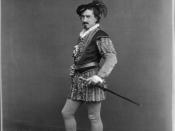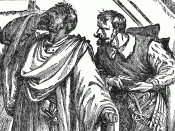To what extent is Othello's downfall, the result of his own Character?
We are first introduced to Othello in Act One, Scene Two. This is a very intimate scene between Iago and Othello. Iago has now joined Othello and has told him about Rodrigo's betrayal of the news of his marriage to Brabantio's daughter. Iago continues his deliberate misrepresentation, swearing to Othello that he could have killed Roderigo for what he did:
'Though in the trade of war I slain men'
Iago is a very skilful actor and is able to successfully present a contrary appearance. It is not just Othello who is deceived by Iago nearly all the characters in the play underestimate Iago's powers of deception. Ironically, Iago alludes to Janus, the two faced god in this conversation with Othello. Since Iago himself is two faced, in a duplicitous way, Janus seems to be a fitting figure for Iago to invoke:
'By Janus, I think no'.
Iago's duplicity is again exhibited in this scene as his tone swings from friendly to backbiting as soon as Othello steps away and quickly returns to original friendliness when Othello returns. The theme appearance versus reality is especially relevant to the issue of Iago's character; for although he is called 'honest' by almost everyone in the play, he is treacherous, deceitful, and manipulative. Iago plays a major part in Othello's eventual downfall through his careful manipulation of Othello's jealous character. Othello is defensively proud of himself and his achievements, and especially proud of the honourable appearance he presents. The allegations of Desdemona's affair hurt his pride even more than they inflame his vanity and jealousy. Othello wants to appear powerful, accomplished, and moral at every possible instance, and when this is almost denied to him, his wounded pride...
![From the Library of Congress: TITLE: Thos. W. Keene. Othello CALL NUMBER: POS - TH - 1884 .O7, no. 1 (C size) [P&P] REPRODUCTION NUMBER: LC-USZC6-58 (color film copy transparency) RIGHTS INFORMATION: No known restrictions on publication. MEDIUM: 1 print (](https://s.writework.com/uploads/9/94760/library-congress-title-thos-w-keene-othello-call-number-pos-thumb.jpg)


Good Job
A great analysis on a very interesting play. At times you do tend to drift into narrative instead placing forth full arguments. In order to avoid this, you should change the structure. Try not to discuss the play in chronological terms; instead, group themes and arguments together.
5 out of 5 people found this comment useful.